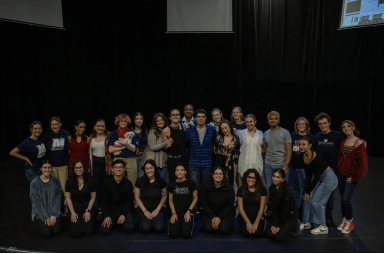Over the last two months, I had the privilege of being the Production Stage Manager for the Monmouth University Department of Music and Theatre Arts’ production of “Pippin.” “Pippin” was originally a show set during the Crusades, but director Professor Sheri Anderson put a creative spin on the story by setting it at modern-day Monmouth University. Opening Nov. 16 and closing Nov. 19 for a sold-out run, the cast and crew put on a show that brought magic and merriment to campus culture.
Opening night started strong with an electric audience that helped drive our performers’ passion for the craft. The cast had the privilege of opening their show to Monmouth University’s president, Patrick Leahy, who showed his support for the Music and Theatre Arts Department.
Due to the unique concept of the show, scenes were set using a series of projections, making Monmouth students and faculty feel at home. The campus community rallied around this production donating costumes and prop pieces for the show. Audiences watched Pippin navigate the challenges and successes of his first year at college, ultimately finding his place amongst his theater friends, much like members of the cast did.
Theater is an art and very much a labor of love and passion. The polished production you see on stage involves lots of preparation, trial and error, and behind-the-scenes work. After auditions in late September, the cast began rehearsing four nights a week, Monday through Thursday learning their lines, blocking, and choreography.
Assistant Directors Brooke Tortorelli, Kiefer Walsh, and Julianna Chesla helped Anderson’s vision come to light. Tortorelli directed the extraordinary sequence which was pre-recorded at Casola Farms, Walsh directed “War is a Science and Glory”, and Chesla, who also served as Assistant Costume Designer, frequently gave her creative input as scenes were blocked.
Intertwined with the blocking was explosive choreography by Madeline Yahr. The choreography was captivating and exciting, having some audience members dancing in their seats.
Assistant Choreographers Jillian Bodiford and Daphne Valenzuela were also given opportunities to shine, choreographing “Morning Glow” and “On the Right Track,” respectively.
As the actors on stage learned their material, the stage management team prepared and organized the technical elements. Assistant Stage Managers Victoria Ponce and Luke Hernandez served as my right hand, making sure scene changes occurred efficiently, props were organized, and everyone on and off-stage was on the same page. They also helped me maintain the crew including people on deck, in the booth, and operating the boards.
By early November, we were getting ready to introduce technical elements including track cues, projections, and lighting. Starting Friday, Nov. 10, the production entered technical rehearsals, which included a full day Saturday rehearsal and even continued into Monday night’s rehearsal. Still, the cast and crew were able to perform the show from beginning to end in show conditions on Tuesday, Nov. 14. Getting two full run-throughs in before opening night.
Our cast of 17 boasted 11 first-year students, many of whom shared Pippin’s journey of finding a home on the Monmouth campus through theater. And for the six upperclassmen, they continued to grace the stage with their talent, mentoring and accepting new Monmouth performers with open arms.
Closing night was performed with the same passion as every night before, but with a special guest in the audience. A representative from The Kennedy Center attended the performance to review both the show itself and the individual actors. The cast and I also had the opportunity to attend a talk-back with the representative after the show who asked us questions and provided feedback.
While at the talkback, the remaining crew, under the direction of Technical Director and Scenic Designer Rusty Carroll, began strike, or the deconstruction of the set and any technical elements that were put into place for the show. Strike is an essential part of the theatrical process because it leaves the space open for the next production.
While this is the end of an era for me, it is certainly not the last time I will be involved in theater at Monmouth. I’m looking forward to being involved in MU Players Cabaret for a Cause on Dec. 2, the Monmouth University Department of Music and Theatre Arts production of “Wit” from Feb. 29 through Mar. 3, and the yet-to-be-announced MU Players’ student-run production in April.




